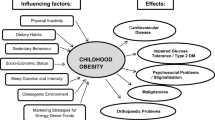Abstract
In order to successfully address the problem of childhood obesity, effective weight management programs must be established by a variety of clinicians to treat the increasing numbers of overweight and obese children and adolescents. An effective program will: 1) identify children and adolescents with health risks related to excess fat, 2) help families make permanent healthy lifestyle changes, and 3) provide ongoing care to optimize long-term health. Building a pediatric weight management program which achieves these goals requires attention to several aspects, including location, personnel, equipment, institutional support, marketing, referral base, focus of the overall approach, and billing & reimbursement. Maintaining the program after it is established can be enhanced by concentrating on team communication, continuing education, continuous quality improvement, and improving adherence.
Similar content being viewed by others
References
Davis MM, Gance-Cleveland B, Hassink S, et al. Recommendations for prevention of childhood obesity. Pediatrics. 2007;120(Suppl 4):S229–53.
Oude Luttikhuis H, Baur L, Jansen H, et al. Interventions for treating obesity in children.[update of Cochrane Database Syst Rev. 2003;(3):CD001872; PMID: 12917914]. Cochrane Database Syst Rev 2009:001872.
Spear BA, Barlow SE, Ervin C, et al. Recommendations for treatment of child and adolescent overweight and obesity. Pediatrics. 2007;120(Suppl 4):S254–88.
Commission on Dietetic Registration. Certificate of Training in Childhood and Adolescent Weight Management., 2009.
Wadden TA, Didie E. What’s in a name? Patients’ preferred terms for describing obesity. Obes Res. 2003;11:1140–6.
Latner JD, Stunkard AJ. Getting worse: the stigmatization of obese children. Obes Res. 2003;11:452–6.
Kuczmarski RJ, Ogden CL, Grummer-Strawn LM, et al. CDC growth charts: United States. Advance data 2000:1–27.
Krebs NF, Himes JH, Jacobson D, et al. Assessment of child and adolescent overweight and obesity. Pediatrics. 2007;120(Suppl 4):S193–228.
Dietz WH, Robinson TN. Clinical practice. Overweight children and adolescents. N Engl J Med. 2005;352:2100–9.
Thompson FE, Byers T. Dietary assessment resource manual. J Nutr. 1994;124:2245S–317.
Lissner L. Measuring food intake in studies of obesity. Public Health Nutr. 2002;5:889–92.
Savoye M, Shaw M, Dziura J, et al. Effects of a weight management program on body composition and metabolic parameters in overweight children: a randomized controlled trial. JAMA. 2007;297:2697–704.
Johnston CA, Tyler C, McFarlin BK, et al. Weight loss in overweight Mexican American children: a randomized, controlled trial. Pediatrics. 2007;120:e1450–7.
Golley RK, Magarey AM, Baur LA, et al. Twelve-month effectiveness of a parent-led, family-focused weight-management program for prepubertal children: a randomized, controlled trial. Pediatrics. 2007;119:517–25.
Savoye M, Shaw M, Dziura J, et al. Effects of a weight management program on body composition and metabolic parameters in overweight children: a randomized controlled trial. JAMA. 2007;297:2697–704.
Tershakovec AM, Watson MH, Wenner WJ Jr, et al. Insurance reimbursement for the treatment of obesity in children. J Pediatr. 1999;134:573–8.
Warm EJ. Diabetes and the chronic care model: a review. Curr Diabetes Rev. 2007;3:219–25.
Ely AC, Banitt A, Befort C, et al. Kansas primary care weighs in: a pilot randomized trial of a chronic care model program for obesity in 3 rural Kansas primary care practices. J Rural Health. 2008;24:125–32.
Griffith J, Gantz S, Lowry J, et al. Insurance reimbursement in a university-based pediatric weight management clinic. J Natl Med Assoc. 2007;99:1037–41.
Barlow SE, Dietz WH. Obesity evaluation and treatment: Expert Committee recommendations. The Maternal and Child Health Bureau, Health Resources and Services Administration and the Department of Health and Human Services. Pediatrics. 1998;102:E29.
Barlow SE, Expert Committee. Expert committee recommendations regarding the prevention, assessment, and treatment of child and adolescent overweight and obesity: summary report. Pediatrics. 2007;120(Suppl 4):S164–92.
The Obesity Society. The Obesity Society: Education., 2009.
Barlow SE, Ohlemeyer CL. Parent reasons for nonreturn to a pediatric weight management program. Clin Pediatr (Phila). 2006;45:355–60.
Wilfley DE, Stein RI, Saelens BE, et al. Efficacy of maintenance treatment approaches for childhood overweight: a randomized controlled trial. JAMA. 2007;298:1661–73.
Svetkey LP, Stevens VJ, Brantley PJ, et al. Comparison of strategies for sustaining weight loss: the weight loss maintenance randomized controlled trial. JAMA. 2008;299:1139–48.
Acknowledgements
This article was supported in part by the Adolescent Health Protection Program (School of Nursing, University of Minnesota) grant number T01-DP000112 (PI: Bearinger) from the Centers for Disease Control and Prevention (CDC). Its contents are solely the responsibility of the authors and do not necessarily represent the official views of the CDC.
Author information
Authors and Affiliations
Corresponding author
Rights and permissions
About this article
Cite this article
Edwards, N.M., Schwarzenberg, S.J. Designing and implementing an effective pediatric weight management program. Rev Endocr Metab Disord 10, 197–203 (2009). https://doi.org/10.1007/s11154-009-9110-z
Published:
Issue Date:
DOI: https://doi.org/10.1007/s11154-009-9110-z




